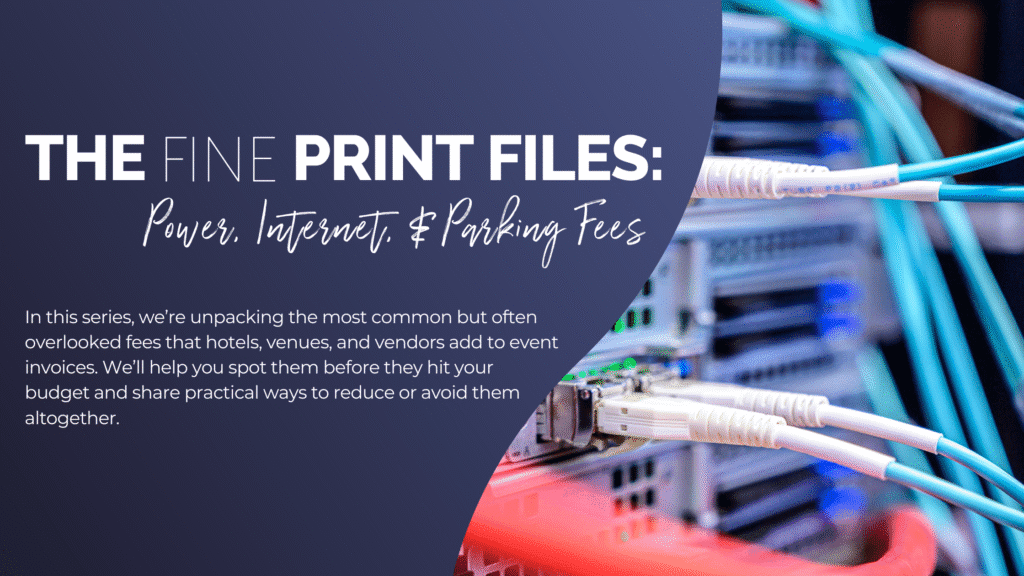
The Fine Print Files: Power, Internet, & Parking Fees
Have you ever reviewed an event bill and found an unwelcome surprise? You’re not alone. In this series, we’re unpacking the most common but often overlooked fees that hotels, venues, and vendors add to event invoices. Whether it’s a mysterious service charge or a hidden setup fee, we’ll help you spot them before they hit your budget and share practical ways to reduce or avoid them altogether.
Power Fees

Behind every bright idea is great power distribution.
Power fees might seem unnecessary at first. However, remember that electricity is never truly "free." Just as you pay for power at home or in the office, venues must also charge for electricity used during events. The difference is scale. Large events such as conferences, galas, and tradeshows often require significant power. They need electricity to operate projectors, microphones, LED screens, and lighting systems. In many cases, the venue must supply at least 200 amps of power. That’s about the same as the electrical panel in a typical home. In addition to electricity costs, venues often charge labor fees for setup and dismantling (or "striking") power. These tasks operate on four-hour minimums each. You may also see charges for power distribution. This covers equipment and supplies that help deliver power where it’s needed. Examples include extension cords, Edison plugs, power strips, and even the tape used to secure cords to the floor. Smaller meetings require power planning too. Conference or boardroom outlets often share the same circuit. This setup limits the available amperage. Before plugging in several devices, confirm how many amps the outlets can handle. Doing so helps you avoid overloading the circuit. Some venues charge power fees automatically once you use the outlets. Others may have locked covers that require advance arrangements for access. Power pricing varies by venue. However, one thing remains consistent: you cannot bring in your own power source.
Internet Costs

You don’t need to know how Wi-Fi works—you just need it to work at your event.
You may be used to free Wi-Fi in hotel rooms. However, internet access for events works very differently. Some venues include complimentary Wi-Fi in meeting spaces, but many do not. Pricing can vary dramatically depending on the venue, required bandwidth, and duration of use. We’ve seen rates range anywhere from free to as high as $50,000. Before committing to an internet package, consider what you will actually use it for. Bandwidth needs depend heavily on your event’s requirements. A basic connection of about 3 Mbps allows for email and light browsing. However, that speed is not enough for streaming, downloading large files, or transferring presentations. If your event includes live streaming, virtual participation, or multiple speakers sharing slides, you’ll need more bandwidth. If you invested in a conference app, your attendees will need reliable internet to use it effectively. Reliable internet is crucial for your A/V team, registration systems, presenters, and main session operations.
WiFi & Ethernet
In today’s event environment, nearly every element depends on connectivity. This includes check-in, live polling, and communication systems. To keep things running smoothly, create different Wi-Fi channels for specific groups. Separate channels for staff, A/V teams, attendees, and VIPs help manage bandwidth. This setup ensures essential systems stay connected even when general use spikes. For the most critical event functions, arrange a dedicated Ethernet line instead of relying only on Wi-Fi. Even if you purchase a wireless package, shared usage can cause slow speeds or dropped connections. High-demand moments can strain the system. Investing in a secure, wired connection for key components helps your event run smoothly from start to finish. You may choose to bring in your own internet provider, but you must coordinate with the venue. This coordination ensures your setup does not interfere with their existing systems. Without prior approval, the venue may disable external connections without notice.
Parking Fees & Valet Charges
Parking is another often-overlooked element that can quickly increase your event budget. In Florida, for example, the average daily rate for self-parking ranges from $35 to $55 per vehicle. That cost continues to rise each year. While parking may seem straightforward, there are several important considerations beyond price alone. Before negotiating parking rates, confirm whether the venue has enough available spaces. This step is crucial for large conferences or regional meetings where most guests plan to drive. Also consider oversized vehicles, such as trucks or RVs. These may require special arrangements or off-site parking options. Verify that self-parking is available, since some properties offer only valet service. If valet parking is important for your group, confirm that the venue provides it. Make sure the valet hours align with your event schedule. Valet service sometimes ends earlier than your program, creating logistical challenges at the end of the day. For day attendees who are not staying overnight, confirm how parking access will be managed. Will they receive a ticket, a sticker, or a code for the payment machine? Clear communication ensures smooth arrivals and prevents confusion at the gate or kiosk.

Plugged in. Connected. Ready to roll.
It’s also wise to review how vendors and suppliers will park on-site. Some venues do not extend complimentary parking to vendors, which means those charges could appear on your final bill.
How to Manage All These Fees
Partnering with an experienced event designer, like Blue Spark Event Design, can make all the difference when it comes to managing venue costs. Our team knows how to navigate contracts, ask the right questions, and negotiate fair rates on your behalf. Even when certain fees cannot be eliminated entirely, we work to minimize their impact and handle the details so you don’t have to. By relying on our experience and industry relationships, you gain both cost savings and peace of mind—ensuring your event runs smoothly, efficiently, and without unnecessary stress.
